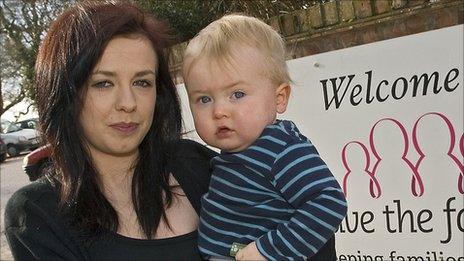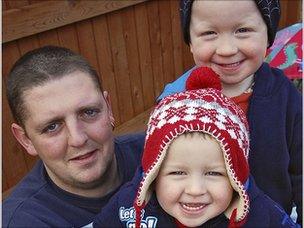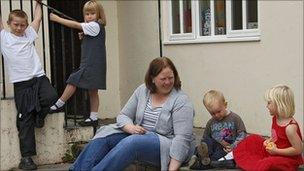Village life for homeless families
- Published

Vicky was referred to Save The Family by her social workers who were worried about her lifestyle and mental health
Children are at greater risk of being taken in to care when a family is made homeless, a terrifying thought for many struggling parents. But for some, help is at hand, in the form of a purpose-built village in north Wales, which aims to keep loved ones together.
"I've done that much crying I can't shed tears any more."
That was 18-year-old Vicky's reaction when she arrived at Save The Family's hostel in Northop, Flintshire, with her eight-month-old son Rhys.
Vicky has been homeless since she was 15, when she had to leave her family home after falling out with her mother.
"I was never angry, I got a bit wild, then depressed and that's when self-harming came into it."

Social services now have no contact with Celia's children McKenzie and Cruz
She admitted: "I've lost count of what number hostel this is."
Vicky had been referred to Save The Family by her social workers, who were worried about her lifestyle and mental health.
They felt the charity could provide her with a safe and stable environment, with extra support she could not get at other hostels.
Most residents have been referred by their local council's housing department or social services because of the extra support the hostel gives.
Many turn up with just a bin bag of belongings.
They were often "very broken, damaged, hurt, frightened people," said 75-year-old Edna Speed, who is in charge.
She explained Save The Family, which has been running for 30 years, saw itself as an alternative to the care system.
"We have to look at statistics of care and say, 'So it works does it?'
"It jolly well doesn't. The statistics are frightening and I am rubbing shoulders with the outcomes of care every day.
"I believe that families are the ultimate, they are the anchor. There is much work to be done on how we keep more families together."
Success stories
Residents are offered support in all aspects of their lives including housing, debt, relationship and parenting problems, their addictions and how to live with their past.
The staff are either ex-residents themselves or have gone through similar traumatic experiences which they believe is the key to truly identifying with the residents.
"You put on your make-up but the scars are still there underneath," said 32-year-old Celia.
After becoming homeless at 18 she became addicted to prescription drugs. She had four children that were taken away from her and adopted by others which devastated her.
But she has gone on to have another two children - four-year-old McKenzie and two-year-old Cruz - with her partner Kevin. This time, with the help of Save The Family, she is making a success of motherhood.
She said the support and lessons in parenting skills and budgeting she received at the village had enabled her to get her life back on track.
She, Kevin and the boys have recently moved to a terraced house 15 miles away that is also run and supported by the charity. It is the family's first step towards living on their own.
Edna said she was convinced that if Celia had had more "substantial support in the right atmosphere, that wasn't threatening," she would have kept her first four children.
"I'll never heal but I've got to go on haven't I?," said Celia.
She is working towards the day when she can be reunited with her adopted children, when they are adults.
"When they come back they will want to see a good person who is doing well, they won't want to see me if I'm a down and out. I'm proving I can be a good mum."
Rule breakers
The village, made up of 24 cottages, is funded by grants, charity donations and the benefits that the residents receive.
"It's not a boot camp but it's not a holiday camp either," said Edna.
Residents have to sign a contract to say they will abide by the rules, which includes being up and dressed by 0900 BST. If they break the rules they have straight-talking Edna to answer to.
Tensions can rise in the village. During Vicky's stay she said she had been threatened.
Helen Walsh, head of family services at the village, said however they were quick to nip things in the bud but she was not surprised how quickly tensions spilled over into real aggression.
"I think that's how they are in the community and I think that's how some of them have got themselves in the predicaments they're in.
"That's why you have to get them together to see if they can resolve the conflict themselves.
"It means when they go back into the community they know how to handle conflict without it blowing up and escalating."
Edna acknowledged her team could not sort out every resident and has been criticised for making the residents too dependent.
"We've been criticised for being a community but people only become dependent if there isn't an alternative," said Edna.
"If the communities they go back into have not got the community structure, then yes they are dependent because it's going to happen again."
"But we never turn them away if it's ten years, twenty years, two months, two weeks."

Staff are on site 24 hours a day and visit residents in their cottages
Save The Family is a Christian charity but it is not compulsory to attend their church services, although most do.
Support worker Lindsay defended the religious aspect: "A lot of people would say, 'You've got vulnerable families, vulnerable children you shouldn't be encouraging them to believe in god'.
"Why not? It's the one thing that I know within this place makes a difference."
Edna said there was no pressure on residents: "If we don't pray together we still love you, we're still equal."
Vicky's stay at the hostel had many ups and downs. She ended her volatile relationship with Rhys's father Mark, who would then not give him back after a visit.
She started missing curfews and admitted to drinking and taking drugs. Staff urged Vicky to fight for Rhys and she eventually was given visitation rights.
"I will get him back," said Vicky.
"If Save the Family hadn't taken us in god knows where I'd be now, I'd probably be dead or in a gutter."
Helen Walsh summed up the aim at the village: "If someone can say they feel safe now and they're not running or their windows haven't been smashed in.
"Or they haven't seen their mum beaten up and they can sleep on a clean bed for the first time and without being harassed, that is brilliant and that's why we're here."
The charity is due to open its second homeless village in Chester in summer 2011.
Fix My Family is on BBC Two on Monday 18 April at 2100 BST or online via iPlayer at the above link.
- Published14 April 2011
- Published30 March 2011
- Published22 March 2011
- Published15 March 2011
- Published14 March 2011
- Published7 March 2011
- Published6 March 2011